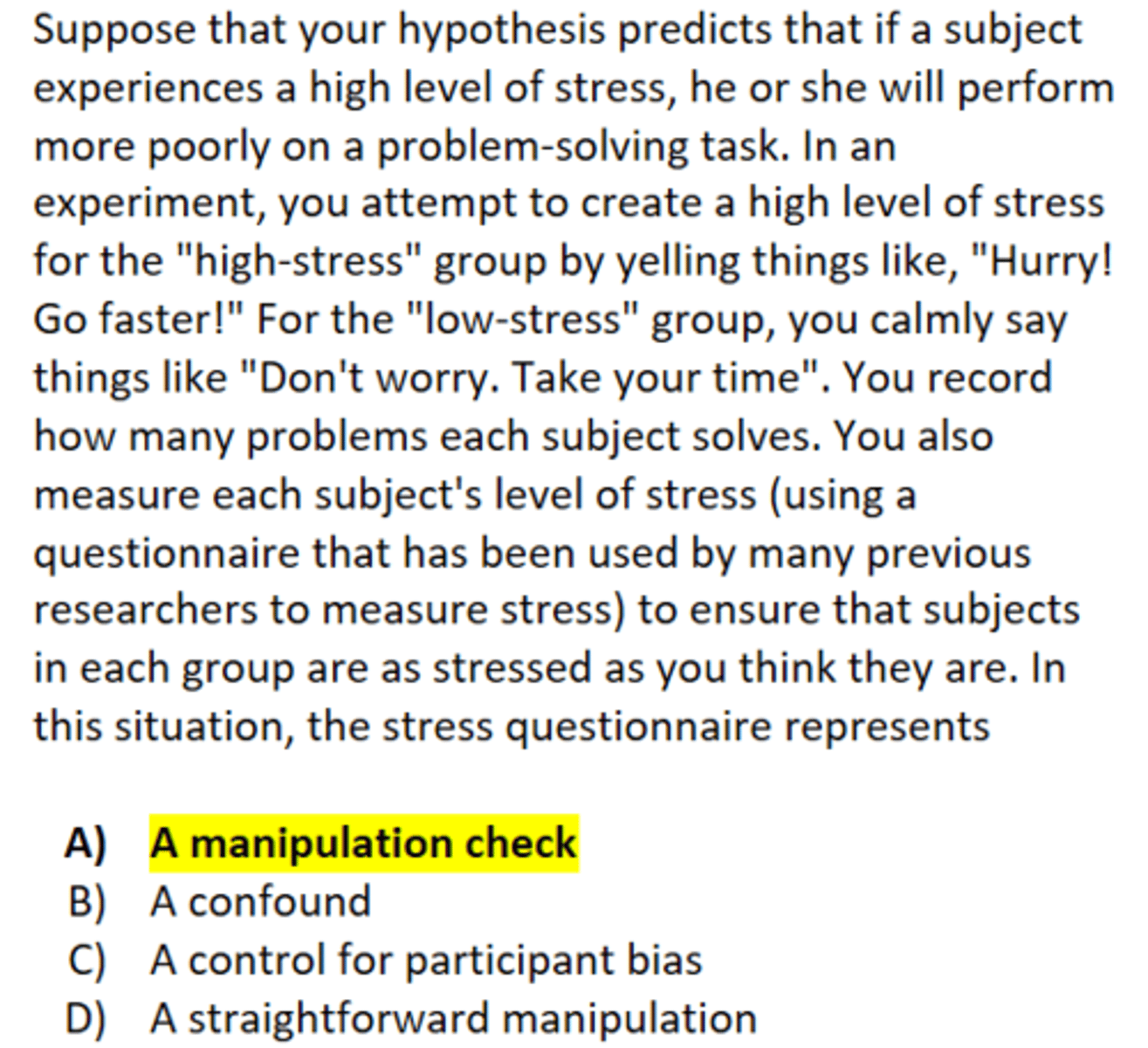Research Methods Practice Test Exam 2
1/17
There's no tags or description
Looks like no tags are added yet.
Name | Mastery | Learn | Test | Matching | Spaced |
|---|
No study sessions yet.
18 Terms
Imagine that you are administering a survey. On an extremely snowy day, you obtain a sample of respondents by standing in front of the union and asking people to complete your survey as they walk by, What type of sampling technique are you using?
A) Probability sampling
B) Random sampling
C) Snowball sampling
D) Convenience Sampling
D) Convenience Sampling
What is wrong with the following yes or no survey item? Do you find your research methods class to be educational and stimulating?
A) It is a loaded question
B) Students will feel pressured into yea-saying
C) Opinion questions should have agree-disagree response options rather than a yes or no option
D) It is a double-barreled question
D) It is a double-barreled question
A multiple-choice question would be considered"
A) Inappropriate for gathering demographic information
B) A closed-ended question
C) Reliable
D) A loaded question
B) A closed-ended question
An advantage of open-ended survey question is that:
A) They permit respondents to express exactly how they feel
B) It is easy to summarize the respondents answers because there is no correct answer
C) They naturally lead to follow up questions because they are open ended
D) The response options are made clear to the respondent
A) They permit respondents to express exactly how they feel
Suppose that your hypothesis predicts that if a subject experiences a high level of stress, he or she will perform more poorly on a problem-solving task. In an experiment, you attempt to create a high level of stress for the "high-stress" group by yelling things like, "Hurry! Go faster!" For the "low-stress" group, you calmly say things like "Don't worry. Take your time". You record how many problems each subject solves. You also measure each subject's level of stress (using a questionnaire that
A) A manipulation check

Which one of the following situations is NOT possible for a measurement instrument?
A) The measurement instrument is reliable and valid.
B) The measurement instrument is not reliable and not valid.
C) The measurement instrument is not reliable but it is valid.
D) The measurement instrument is reliable but it is not valid.
C) The measurement instrument is not reliable but it is valid.
If a measurement instrument is truly measuring the characteristic that we think it is measuring, we say that the instrument shows:
A) reliability
B) predictive validity
C) split-half reliability
D) construct validity
D) construct validity
A community college uses a set of code numbers to indicate the number of credits that each student has completed. Students who have at least 50 credits are coded as "4". Students who have from 24 to 49 credits are coded as "3". Students who have from 15 to 23 credits are coded as "2". Students who have less than 15 credits are coded as "1". This system of coding students in terms of the number of credits they have completed represents what type of measurement scale?
A) nominal
B) ordinal
C
B) ordinal
Which of the following is a consequence of a measurement scale having an "absolute zero"?
A) You can form meaningful ratios between measurements.
B) You cannot compare one measurement to another.
C) You can never actually assign a measurement of zero to any observation.
D) You do not have to specify the units of measurement (e.g., pounds, inches, etc.).
A) You can form meaningful ratios between measurements.
If you are told that an electronic device that measures the wavelength of light is a reliable measurement instrument, it means that:
A) it is the device that is used by most researchers to measure the wavelength of light.
B) it gives you the same measurement every time you measure the wavelength of a particular light.
C) it can distinguish between lights that have different wavelengths but appear similar.
D) it always displays results in the same measurement units.
B) it gives you the same measurement every time you measure the wavelength of a particular light.
Nominal
Difference in quality
Ordinal
Crude information about quantity
Interval
Tells us how much scores differ
Ratio
Tells us how much of the quality is present
Nominal Example
Eye color, hand dominance, college major
Ordinal Example
Rank ordered
1) education, 2) healthcare, 3) crime
Interval Example
Temperature, IQ
-Scale of 1-7 rate your mood
Ratio Example
Time, weight, length